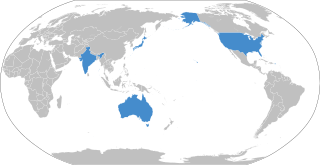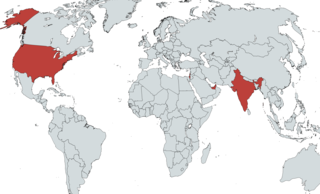
Sheikh Mohamed bin Zayed bin Sultan Al Nahyan, commonly known by his initials as MBZ or MbZ, is an Emirati royal and politician who currently serves as the third president of the United Arab Emirates and ruler of Abu Dhabi.

The Middle East and North Africa (MENA), also referred to as West Asia and North Africa (WANA) or South West Asia and North Africa (SWANA), is a geographic region which comprises the Middle East and North Africa together. However, it is widely considered to be a more defined and apolitical alternative to the concept of the Greater Middle East, which comprises the bulk of the Muslim world. The region has no standardized definition and groupings may vary, but the term typically includes countries like Algeria, Bahrain, Egypt, Jordan, Kuwait, Lebanon, Libya, Morocco, Oman, Qatar, Saudi Arabia, Syria, Tunisia, the UAE, and Yemen.
The history of the Jews in the United Arab Emirates describes the historical and modern presence of Jews over the millennia in the Middle East and the recorded meetings with Jewish communities in areas that are today in the geographic territories of the United Arab Emirates.

Israel–United Arab Emirates relations traces its origins to the early days of the Oslo Accords, where Israeli and Emirati diplomats had contact with each other in the 1990s in Washington, D.C. The first diplomatic facility between the two countries opened in 2015, when Israel opened an official diplomatic mission in Abu Dhabi to the International Renewable Energy Agency.

Turkey and the United Arab Emirates share extensive cultural, military and economic ties, but relations have substantially deteriorated since Arab Spring, and later started to recover in the recent years.

India–United Arab Emirates relations are the bilateral relations that exist between the Republic of India and the United Arab Emirates. Since 3000 B.C., India and the UAE, including its precursor emirates, had close relations with ancient trade networks. Sumerians traded with Meluhha, Magan, and Dilmun (Bahrain), connecting through the UAE. Maritime routes facilitated Arab trade with India for silk, spices, gold, and porcelain. Sumerians traded with Meluhha, Magan, and Dilmun (Bahrain), connecting through the UAE. Maritime routes facilitated Arab trade with India for silk, spices, gold, and porcelain. Post-1971, India-UAE relations strengthened politically, economically, and culturally.

Palestinian Territories - United Arab Emirates relations are the economic and political relations between the United Arab Emirates and The Palestinian Territories. The United Arab Emirates (UAE) has a Liaison Office in Ramallah while the Palestinian Authority maintain an embassy in Abu Dhabi. Both UAE and the Palestinian Authority form part of the Middle East region and share strong cultural ties. Like other Muslim countries, the UAE supported the independence of Palestinian people. Many Palestinians travel, work, and reside in the UAE. In recent years however, there has been a relapse in relations, as UAE strengthened diplomatic ties with Israel.

Saudi Arabia–United Arab Emirates relations are the relations between two neighbouring countries that share extensive political and cultural ties. The two countries are close allies in terms of foreign policy, geopolitical interests, economical interests, and military alliance.

The Quad is a grouping of Australia, India, Japan, and the United States that is maintained by talks between member countries. The grouping was initiated in 2007 by Japanese Prime Minister Shinzo Abe, with the support of Australian Prime Minister John Howard, Indian Prime Minister Manmohan Singh and U.S. Vice President Dick Cheney. The dialogue was paralleled by joint military exercises of an unprecedented scale, titled Exercise Malabar. The diplomatic and military arrangement was widely viewed as a response to increased Chinese economic and military power.

The State of Israel and the Kingdom of Saudi Arabia have never had formal diplomatic relations. In 1947, Saudi Arabia voted against the United Nations Partition Plan for Palestine, and currently does not recognize Israeli sovereignty. However, as of 2023, bilateral negotiations towards Israeli–Saudi normalization are ongoing, with the United States serving as the two sides' mediator.
Arab–Israeli relations refers to relations between Israel and Arab nations. Israel's relations with the Arab world are overshadowed by the Arab–Israeli conflict and the Israeli–Palestinian conflict. Israel has been at war with Arab states on several occasions. Furthermore, a large majority of states within the Arab League do not recognize Israel, and Israelis and Jews in general are considered a frequent target of antisemitism in the Arab world. After several Arab-Israeli wars, Egypt was the first Arab state to recognize Israel diplomatically in 1979 with the signing of the Israel-Egypt Peace Treaty. It was followed by Jordan with the Israel-Jordan Peace Treaty in 1994. In 2020, four more Arab states normalized relations. There have also been talks of an emerging Arab–Israeli alliance against Iran.
The Qatar diplomatic crisis was a high-profile incident involving the deterioration of ties between Qatar and the Arab League between 2017 and 2021. It began when Saudi Arabia, the United Arab Emirates, Bahrain, and Egypt simultaneously severed their bilateral relations with Qatar and subsequently banned Qatar-registered aircraft and Qatari ships from utilizing their sovereign territory by air, land, and sea; this involved the Saudis' closure of Qatar's only land crossing, initiating a de facto blockade of the country. Tensions between the two sides came to a close in January 2021, following a resolution between the Saudis and the Qataris.

The Arab–Israeli alliance is an unofficial security coalition comprising Israel and various Arab countries. Originally formed in the interest of the Gulf Cooperation Council, it is primarily focused on deterring the political and military ambitions of Iran, which has a proxy conflict both with Saudi Arabia and with Israel. It has been actively promoted by the United States since the February 2019 Warsaw conference. It is sometimes referred to as the Israeli–Sunni alliance, due to the Arab countries in it being predominately Sunni states, while Iran and much of its Axis of Resistance are predominately Shia.

The Israel–United Arab Emirates normalization agreement, officially the Abraham Accords Peace Agreement: Treaty of Peace, Diplomatic Relations and Full Normalization Between the United Arab Emirates and the State of Israel, was initially agreed to in a joint statement by the United States, Israel and the United Arab Emirates on August 13, 2020, officially referred to as the Abraham Accords. The UAE thus became the third Arab country, after Egypt in 1979 and Jordan in 1994, to agree to formally normalize its relationship with Israel, as well as the first Persian Gulf country to do so. Concurrently, Israel agreed to suspend plans for annexing parts of the West Bank. The agreement normalized what had long been informal but robust foreign relations between the two countries. The agreement was signed at the White House on September 15, 2020. It was approved unanimously by the Israeli cabinet on October 12 and was ratified by the Knesset on October 15. The UAE parliament and cabinet ratified the agreement on October 19. The agreement went into effect on January 5, 2021.

The Abraham Accords are bilateral agreements on Arab–Israeli normalization signed between Israel and the United Arab Emirates and between Israel and Bahrain on September 15, 2020. Mediated by the United States, the announcement of August 13, 2020, concerned Israel and the Emirates before the subsequent announcement of an agreement between Israel and Bahrain on September 11, 2020. On September 15, 2020, the signing of the agreements was hosted by US president Trump on the Truman Balcony of the White House amid elaborate staging intended to evoke the signings of historic formal peace treaties in prior administrations.

Since the 1970s, there has been a parallel effort made to find terms upon which peace can be agreed to in the Arab–Israeli conflict and also specifically the Israeli–Palestinian conflict. Over the years, numerous Arab League countries have signed peace and normalization treaties with Israel, beginning with the Egypt–Israel peace treaty (1979). Despite the failure to implement the Israeli–Lebanese peace accords (1983), more treaties continued with the Israeli–Palestinian peace process (1991–present), the Israel–Jordan peace treaty (1994), the Abraham Accords normalizing relations between Israel–United Arab Emirates and Israel–Bahrain (2020), the Israel–Sudan normalization agreement (2020) and the Israel–Morocco normalization agreement (2020). Moreover, numerous Arab League members established semi-official relations with Israel.

The Negev Summit was a summit that took place on 27–28 March 2022 in Sde Boker, Israel, in which Israeli Foreign Minister Yair Lapid hosted the foreign ministers of Bahrain, Egypt, Morocco and the United Arab Emirates, as well as U.S. Secretary of State Antony Blinken.

The Indo-Abrahamic Alliance sometimes known as The Indo-Abrahamic Block or The Middle East QUAD or The Western QUAD or West Asian QUAD or I2-U2 is a geostrategic term coined by the foreign policy thinker and grand strategist Mohammed Soliman in use for a long essay for the Middle East Institute. The Indo-Abrahamic term refers to the growing convergence of geopolitical interests among India, Israel, and the United Arab Emirates, which will create a regional bloc that would include Egypt and Saudi Arabia and eventually fill in the gap left by a future US withdrawal from the Middle East and represents a counterbalance to Turkey and Iran. The Biden Administration later adopted Soliman's Indo-Abrahamic concept by launching the I2U2 Group in October 2021, which was followed by a leaders-level summit in July 2022.
Events in the year 2022 in the United Arab Emirates.















